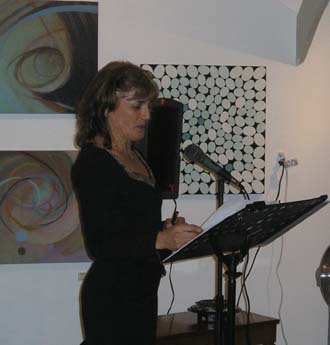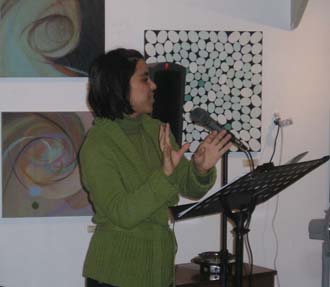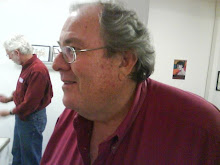
Theresa McCourt

Judy Halebsky
A packed house at SPC brought forth a semblance of heat to the friendly confines of the poetry center. It was February so no one expected much heat, but there was plenty to spare. Even the Japanese mouth organ that accompanied Judy Halebsky at the end of the evening made it to a suitably warm temperature which rendered it playable.
The featured readers for the evening were Judy Halebsky and Theresa McCourt. But Indigo Moor led off the evening with a forceful and heartfelt version of Yusef Kommunyakaa’s “Blue Light Lounge Sutra” where the speaker invokes the devil “to use your head for a drum.” Then Indigo suggested that Judy Halebsky would be someone, if a battle over poetry were raging, you would want to go into battle with. She would be the one carrying the axe.
Judy Halebsky led off the evening in her signature white boots (which I have an inexplicable fetish for—yet surprisingly no other women’s footwear does this for me). She began the evening reading “Prognosis” wherein she made a record of her trespasses and admitted she was not good enough to look you in the eye. The speaker’s ambivalence finally came to rest in the last line where the speaker said, “when it’s not too dark, it’s too bright to see at all.”
In “Butter Melts in Summer” some girls are sunbathing and remarking how their toes were more beautiful than the beach. The speaker notes she should have left right then. At the end the one of the women who is sunbathing starts to yell and accuse the speaker of eating her lunch.
In “How To Find A Man Up To the Task” (which is from Halebsky’s manuscript entitled “Japanese for Daydreamers”) the speaker is on the prowl for a man. She knows that in Japanese there are words that means “too smart for success” and “too beautiful for words.” At the end the speaker comes across a man holding up a sign: quality sperm, bargain prices. Everything available.
In “Red Hollow” Halebsky began to mine her family for material. Her father declares Marx a prophet, and at the end of the poem the speaker is throwing her old dresses off the roof.
“Pigs In a Blanket” was dedicated to LaVerne Frith whom Judy invoked as a pancake-eating fiend and as a poet with an eye for the bingo caller. In the poem appears in front of a stack of blueberry pancakes. To which the speaker responds she has taken out loans to buy red sandals.
In “Radio Poem” there is a good bit of bantering back and forth between two speakers who are arguing about music and aesthetics, and at the end of the poem they end up seemingly on the verge of making a little music of their own.
In “The Big School” the speaker playfully chastises her father for using big words, suggesting this is some sort of compensation for failing kindergarten. Tortuous, cloyed, and pedantic are given their alternative meanings. And finally, the speaker arrives at understanding something about the state of ennui.
In “Sears and Roebuck House” Judy described a family house of hers that was primarily prefabricated and straight out of the Sears Catalog. In the poem Judy remarks that there is a safety pin through your heart to keep it together. The house in question comes equipped with a doorbell that plays Pachelbel’s Canon. But the song plays for so long and so loudly when the door is answered. The speaker’s grandfather sabotages the tape presumably by cutting it.
In “Thin Icy Storm” the term “kamikaze” is invoked but a corrective is issued for that term’s definition. It does not mean suicide. It literally means “divine wind,” and the speaker equates this to “what is missing” and then further she claims what is worse than kamikaze is being a parent to someone who is equally wounded.
Judy Halebsky ended with “Down the Mountain,” the last poem she wrote while attending the Squaw Valley conference. The speaker starts out, “Take me as though nothing is left” and ends with “whatever I came with I spent.”
Theresa McCourt came to the forefront wearing a little black dress that put her in a enviable position. Judy, who in an earlier poem had confessed a weakness for red sandals, seemed especially envious. For all those who might be similarly inclined to wear black to an SPC event, Theresa revealed to me that she found the dress at Mary’s Thrift Store on Northgate. Fourteen bucks! Sorry, Judy. She said that she’s lending it to me first.
The first poem of hers was called “Getting Started” and it was about improving oneself but having doubts about whether that was happening. The poem is about relearning, about recovering an even heart beat. At the end the speaker recalls the grocery list of self doubts she has had
Getting Started
Gimpy, ragged,
shifting
from stillness to motion,
relearning after so many repeated efforts,
that breath will even out,
that heart, after the initial flurry,
will recover an even beat,
that hips and knees
will be anointed
a certain distance from the house.
After one or two miles,
the Achilles will even shed
its shadowy film of scarring,
grown anew
from one night of stiffening sleep.
Since first stepping onto the road,
twenty-four years ago,
I’ve listened to so many of my grumblings,
a variety of complaints—
all of them reciting
what can’t be done,
what I could be doing instead,
what I’m not capable of.
“Along the Canal” is a poem that is set in McCourt’s hometown of Manchester, England amid is industrial despair. The poem begins depicting a stagnant location. Murky water rivers into a meadowy plain. The speaker dreams her first animal, a wolf. At the end of the poem the speaker returns to her focus on the environment. She is in a new meadow thirty years later. Birds reappear and then suddenly they disappear, splintering the air into black ash.
“Passing” was followed by “Notes in the Margin” which was culled from the notes written in the margin of a William Stafford poem ["People Who Went By in Winter"]. In it the “words (that) arrive(d) today” (the notes from the margin that address the common mistakes of subsequent generations in families) end up questioning the speaker as to whisch belongs to the notes in the margin.
In “The Funeral,” a three part poem about her mother’s funeral, McCourt starts out in part one standing in a narrow lane, A shepherd whistles for a collie and her brother tosses a cigarette. In the second part the speaker appears at the scene of the burial and in the third part dialog after the funeral is included. The speaker remembers the priest after the ceremony as the one who piloted her mother's honesty through her despair.
“Winter Run” was dedicated to Theresa McCourt’s longtime running partner, Mona. The speaker in the poem sees several deer and notes how the run she was doing was something she complained about in her 20s. In that way, the poem was about the acceptance of difficulty.
“Vanishing Point” was a look at tragedy. the speaker is set inside a framed picture, a quiet still setting, that of the tragic scene that continues to announce itself. For the speaker the scene seems so removed that it hardly even registers anymore. The speaker addresses the tragic subject as distant, forgotten.
“Folding Laundry” was about diminishing oneself in the role of the parent. The counter to the speaker’s diminishment is the white magnolia blossom opening. At the end, the speaker notes how she goes to full, to half, to quarter the same way her laundry is folded.
In “Winter Planting” a poem (obliquely) about the positive side of parenting.
Winter Planting
By light from the kitchen, this sapling,
quiet in a circle of freshly turned mud:
Naked, except for two tags, a yellow, a white—
one bearing its name; the other, the ways to care for it.
Reddish nubs barely raise its silver bark,
but from it stretch two invisible lines—
one to the apple, the other to the myrtle,
forming a triangle in the garden’s vertical aspect.
Though years behind these two older trees,
it is a presence, loaded with latent fruit.
The apple and the myrtle seem to stand in as parents for the sapling whose presence portends a fruitful future.
“Pain” is addressed to the body nagged by pain, and the poem swells into an examination of a person deliberating over those tiresome, yet essential-to-the-process, difficulties. In this case it is mostly a tendon that is let loose a little. As the speaker addresses the body's frailties, she raises her eyes to egrets, deer and advises the body, because of its tendency to wear out “Attempt nothing without first consulting me.”
Pain
It doesn’t matter which way I apply it. Take one of my more banal approaches: I locked your left Achilles, refusing you those tight turns on the track, when all you sought was speed. So far, I haven't completely tied you up. Here and there, I let your tendon loose a little, unwind a bit, for those more leisurely paces that take you out (slowly, mind) on the soft shoulder of the trail, beside the river, early mornings, so you can see, with the speed I allow, mist rising from the river, in the swirl of currents, the view from the bridge; so that you raise your eyes, stop to watch the geese flying south, the white egret swallow the frog, count the seven deer motionless in the blanched grass—or notice your own incessant commentary. I can stop you any time—because I want you always to remember your weaknesses, take account of them. Do nothing, attempt nothing, without first consulting me.
In “Bearded Iris” the speaker begins, “To you, I gave the leftover places." Razor edges and gnarled rhizomes are invoked, and the bearded iris stands in for someone who is given a second chance. At the end the purple sepals of the iris arch over where the the speaker and the one spoken to begins, signifying a rebirth of friendship despite the prior difficulties.
At the end of the evening Judy Halebsky returned with two of her friends to collaborate on a reading punctuated by handmade Japanese flute and Japanese mouth organ. The text Judy read remained unnamed as far as I could tell but it did include a long catalog of “queen of the _______” phrases. The three complemented each other and were able to improvise around the sound and the silence to deliver an interesting convergence of text and sound.





















No comments:
Post a Comment